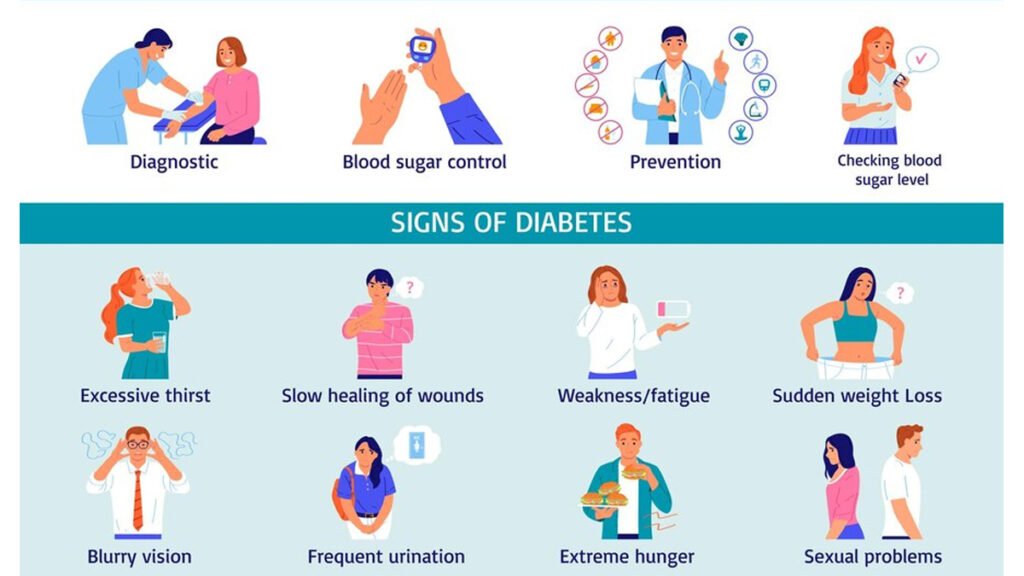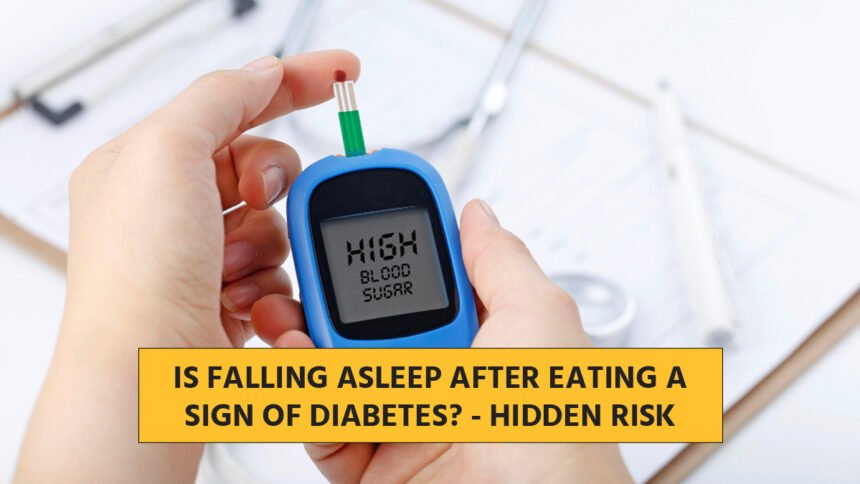Is Falling Asleep After Eating a Sign of Diabetes? – Full Guide
Is Falling Asleep After Eating a Sign of Diabetes-Feeling sleepy after a meal is a common occurrence for many individuals. However, for some, it may raise concerns about underlying health conditions, such as diabetes. This article aims to explore the relationship between falling asleep after eating and diabetes, providing valuable insights into the potential causes and warning signs. By delving into the research and expert opinions, we can gain a better understanding of this phenomenon and its implications for those at risk of or living with diabetes.

What Causes Sleepiness After Eating? (Is falling asleep after eating sugar a sign of diabetes)
Postprandial somnolence, also known as post-meal drowsiness or food coma, is the state of feeling tired or sleepy after consuming a meal, particularly a large one. While it is commonly believed that decreased blood flow to the brain during digestion causes this sleepiness, recent studies have debunked this myth. Instead, researchers have identified other factors that contribute to feeling drowsy after eating, including changes in blood glucose levels, fluctuations in cellular proteins, hormonal imbalances, brain chemicals, inflammation, and the body’s internal clock.
The size and composition of a meal can also play a role in post-meal sleepiness. Larger meals have a greater likelihood of inducing fatigue, and certain foods and nutrients may have a more significant impact. For example, high-carbohydrate meals have been found to make individuals sleepier than high-fat meals. Additionally, the amino acid tryptophan, found in protein-rich foods, can increase serotonin production, which regulates mood and sleep cycles and may contribute to sleepiness.
The Link Between Falling Asleep After Eating and Diabetes
While falling asleep after eating is not specific to diabetes, it can be associated with the condition, particularly when it comes to blood glucose management. Individuals with diabetes may experience fatigue and sleepiness due to both high and low blood sugar levels.
When someone has diabetes, their body struggles to process sugar from food effectively. This can result in high blood glucose levels, leading to excessive tiredness and sleepiness. When glucose is unable to enter cells properly, the body and cells do not receive the energy they need, resulting in diabetes-related fatigue. Additionally, diabetes can cause hormonal changes and mood shifts, making it challenging to concentrate or stay awake for extended periods.
It is crucial to note that post-meal sleepiness can also be attributed to other factors, such as hypoglycemia (low blood sugar) or overeating. Therefore, it is essential to consult a medical professional for a thorough evaluation if you regularly experience fatigue after meals.
Symptoms of Diabetes

Understanding the symptoms of diabetes is essential for early detection and proper management. While falling asleep after eating can be a potential symptom, it is crucial to consider other indicators as well. Common symptoms of diabetes include increased thirst, frequent urination, extreme hunger, blurry vision, and fatigue. Weight loss or gain, slow wound healing, tingling or numbness in the hands and feet, itching skin around the genital area, and dark patches on the skin can also be signs of diabetes. If you experience any of these symptoms, especially in conjunction with falling asleep after eating, it is important to consult with your doctor and undergo testing for diabetes.
Managing Post-Meal Sleepiness and Diabetes
If you are experiencing post-meal sleepiness and have been diagnosed with diabetes, there are several strategies you can incorporate into your daily routine to manage fatigue and promote overall well-being.
1. Balanced Meal Composition
When planning your meals, aim for a balanced combination of carbohydrates, proteins, and fats. This can help regulate blood glucose levels and provide sustained energy throughout the day. Opt for complex carbohydrates like whole grains, fruits, and vegetables, as they have a more gradual impact on blood sugar compared to refined carbohydrates.
2. Regular Physical Activity
Engaging in regular physical activity is beneficial for managing diabetes and combating fatigue. Exercise helps lower blood glucose levels, improve insulin sensitivity, and boost energy levels. Incorporate activities such as walking, cycling, or strength training into your routine, aiming for at least 150 minutes of moderate-intensity exercise per week.
3. Monitoring Blood Sugar Levels
Regularly monitoring your blood sugar levels is crucial for diabetes management. By keeping track of your levels, you can identify patterns and make necessary adjustments to your diet, medication, or physical activity. Consult with your healthcare provider to determine the best monitoring schedule and devices for your specific needs.
4. Healthy Sleep Habits
Establishing healthy sleep habits can significantly impact your energy levels and overall well-being. Aim for 7-9 hours of quality sleep each night, ensuring a consistent sleep schedule and creating a sleep-friendly environment. Avoid electronic devices before bed, practice relaxation techniques, and limit caffeine intake, especially in the evening.
5. Stress Management
Stress can exacerbate fatigue and negatively affect blood glucose control. Incorporate stress management techniques into your daily routine, such as mindfulness meditation, deep breathing exercises, or engaging in activities that bring you joy and relaxation. Additionally, consider seeking support from mental health professionals or support groups to help navigate the emotional aspects of living with diabetes. This also causes a diabetes problem and creates a problem and you might be wondering “Is Falling Asleep After Eating a Sign of Diabetes?”
Conclusion
While falling asleep after eating can be a sign of diabetes in some cases, it is not a definitive indicator. Many factors contribute to post-meal sleepiness, including meal composition, blood glucose levels, and individual physiological responses. It is crucial to consult with a healthcare professional for an accurate diagnosis and appropriate management strategies. By adopting a balanced and active lifestyle, monitoring blood sugar levels, prioritizing quality sleep, and managing stress levels, individuals with diabetes can improve their energy levels and overall quality of life. This way you can clearly the reason for “Is Falling Asleep After Eating a Sign of Diabetes?”
Hope so this article “Is Falling Asleep After Eating a Sign of Diabetes?” might be useful to know what exactly going on with you if your diabetic or unaware of Diabetes symptoms.
Checkout whether Milk is good for diabetes or not. Click Here
Read more on website





